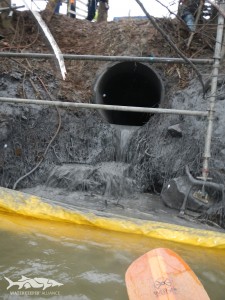By Jennifer Peters, National Water Campaigns Coordinator (Follow Jennifer on Twitter - @EarthAvenger)
If you read the
Associated Press, listen to
NPR or watch
Rachel Maddow on MSNBC, most likely you know about the Duke Energy coal ash spill that happened earlier this month in Eden, NC. What you might not know is that Duke Energy is the
nation’s largest electricity provider, operating over a
dozen coal-burning power plants in six states. Duke owns an additional dozen coal plants that are
retired, including the Dan River Power Station where the recent disaster occurred. All of these plants store coal ash in ponds similar to the pond in Eden, NC that leaked toxic ash into the Dan River when an old stormwater pipe beneath the pond ruptured. In fact, there are over 1,000 ponds in 37 states across the country, many unlined, unmonitored and much larger than the 27-acre pond on the Dan River, and almost all are near streams, rivers, lakes or bays. Many of these vulnerable water bodies are sources of drinking water, just like the Dan River.
What happened in North Carolina could happen at any number of poorly managed coal ash dumps across the country. It’s not a question of if another spill will happen; it’s a question of when and where.
The Duke Energy spill should not have happened, but because of lax state and federal regulations, it did. State and federal regulators have known for years that poorly managed coal ash dumps pose a threat to human health and the environment. The Environmental Protection Agency (EPA) and environmental groups have collectively documented over
200 known cases of coal ash contamination nationwide, including the dramatic spill at the Kingston Plant in TN that is still being cleaned up over five years later. EPA has also
identified nearly 400 water bodies that are sources of drinking water that have been degraded by power plant pollution. Four years ago EPA proposed the first-ever federal regulation for coal ash disposal. And just last year, EPA proposed the first federal limits on the amount of heavy metals and other toxic pollutants power plant utilities can dump in our water.
You read that correctly, there have NEVER been federal regulations for one of the largest and most toxic waste streams in the U.S. and equally shocking, there have never been limits on the amount of nasty chemicals power plants can dump in our water.
Coal-burning power plants don’t have to store their waste in unstable dumps or discharge toxic wastewater into streams, lakes, bays and rivers – they’ve just been allowed to because there are no federal regulations telling them that they can’t. EPA has proposed commonsense standards that could have prevented the recent Duke disaster. But the power plant industry and their buddies in Congress have been stalling EPA’s efforts. EPA needs to know the public supports the agency’s efforts to finalize new rules that will protect communities and the environment from this toxic waste.
Join us today and tell EPA you support strong, meaningful and federally enforceable protections against hazardous coal ash pollution.



